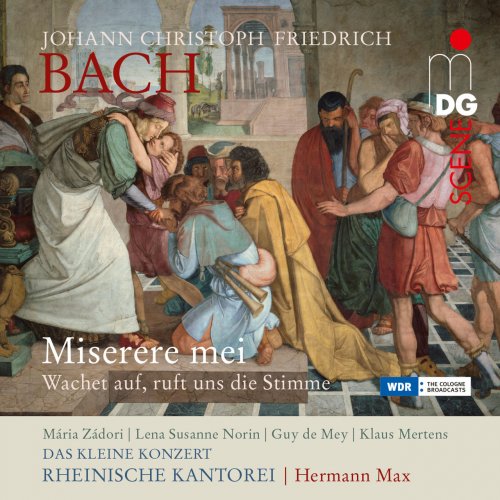
Rheinische Kantorei, Hermann Max, Das Kleine Konzert - J.C.F. Bach: Miserere Mei / Wachet Auf, Ruft Uns Die Stimme (2017)
BAND/ARTIST: Rheinische Kantorei, Hermann Max, Das Kleine Konzert
- Title: J.C.F. Bach: Miserere Mei / Wachet Auf, Ruft Uns Die Stimme
- Year Of Release: 2017
- Label: MDG Scene
- Genre: Classical
- Quality: FLAC (tracks)
- Total Time: 59:14
- Total Size: 284 Mb
- WebSite: Album Preview
Tracklist:
Wachet Auf, Ruft Uns Die Stimme Motette Für Vierstimmigen Chor Und B.c. (13:51)
1. Wachet Auf, Ruft Uns Die Stimme 6:30
2. Zion Hört Die Wächter Singen 4:31
3. Gloria Sei Dir Gesungen 4:43
Miserere In C Für Soli, Chor, 2 Violinen, Viola Und B. C. (43:22)
4. Miserere Mei 3:43
5. Amplius Lava Me 4:12
6. Tibi Soli Peccavi 3:26
7. Ecce Enim In Iniquitatibus Conecptus Sum 2:20
8. Asperges Me Hyssopo 4:41
9. Averte Faciem Tuam A Peccatis Meis 4:25
10. Redde Mihi Laetitiam Salutaris Tui 1:42
11. Libera Me de Sanguinibus 4:22
12. Domine, Labia Mea Aperies 2:57
13. Sacrificium Deo, Spiritus Contribulatus 4:04
14. Benigne Face, Domine 2:32
15. Tunc Acceptabis Sacrificum Justitiae 3:50
Performers:
Mária Zádori (soprano)
Lena S. Norin (mezzo-soprano)
Guy de Mer (tenor)
Klaus Mertens (baritone)
Das Kleine Konzert
Rheinische Kantorei
Hermann Max
Wachet Auf, Ruft Uns Die Stimme Motette Für Vierstimmigen Chor Und B.c. (13:51)
1. Wachet Auf, Ruft Uns Die Stimme 6:30
2. Zion Hört Die Wächter Singen 4:31
3. Gloria Sei Dir Gesungen 4:43
Miserere In C Für Soli, Chor, 2 Violinen, Viola Und B. C. (43:22)
4. Miserere Mei 3:43
5. Amplius Lava Me 4:12
6. Tibi Soli Peccavi 3:26
7. Ecce Enim In Iniquitatibus Conecptus Sum 2:20
8. Asperges Me Hyssopo 4:41
9. Averte Faciem Tuam A Peccatis Meis 4:25
10. Redde Mihi Laetitiam Salutaris Tui 1:42
11. Libera Me de Sanguinibus 4:22
12. Domine, Labia Mea Aperies 2:57
13. Sacrificium Deo, Spiritus Contribulatus 4:04
14. Benigne Face, Domine 2:32
15. Tunc Acceptabis Sacrificum Justitiae 3:50
Performers:
Mária Zádori (soprano)
Lena S. Norin (mezzo-soprano)
Guy de Mer (tenor)
Klaus Mertens (baritone)
Das Kleine Konzert
Rheinische Kantorei
Hermann Max
Johann Christoph Friedrich Bach was a child of his times, which were characterised by new beginnings and profound changes in the political and cultural arena as well as in the societal and philosophical spheres.
The “Miserere” and the motet “Wachet auf, ruft uns die Stimme” on this recording beautifully document these transformations. MDG is now presenting an archive production that has achieved historic status. Hermann Max, a pioneer in the field of historically informed performance practice, performs with the Rheinische Kantorei and his “Das Kleine Konzert” ensemble in a production for the Western German Radio (WDR).
The original heavy content of the “Miserere” (which resurfaced at a London auction in 1975) was slightly changed by the composer to become a penitential psalm with elegant melodic leading and relaxed articulation.
Composed hardly ten years after the “Miserere,” the motet “Wachet auf! ruft uns die Stimme” reveals an entirely different picture. The music emancipates itself from pure textual interpretation and assumes an independent shape.
The “Miserere” and the motet “Wachet auf, ruft uns die Stimme” on this recording beautifully document these transformations. MDG is now presenting an archive production that has achieved historic status. Hermann Max, a pioneer in the field of historically informed performance practice, performs with the Rheinische Kantorei and his “Das Kleine Konzert” ensemble in a production for the Western German Radio (WDR).
The original heavy content of the “Miserere” (which resurfaced at a London auction in 1975) was slightly changed by the composer to become a penitential psalm with elegant melodic leading and relaxed articulation.
Composed hardly ten years after the “Miserere,” the motet “Wachet auf! ruft uns die Stimme” reveals an entirely different picture. The music emancipates itself from pure textual interpretation and assumes an independent shape.
Year 2017 | Classical | FLAC / APE
As a ISRA.CLOUD's PREMIUM member you will have the following benefits:
- Unlimited high speed downloads
- Download directly without waiting time
- Unlimited parallel downloads
- Support for download accelerators
- No advertising
- Resume broken downloads


